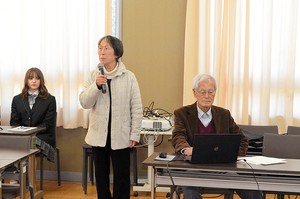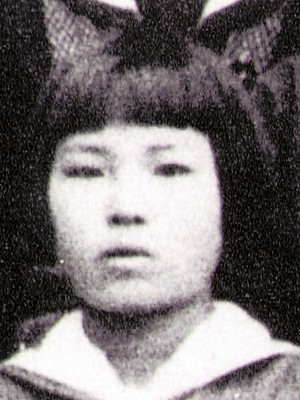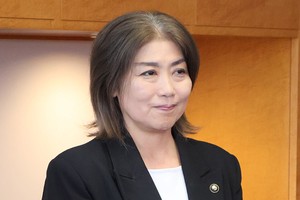By GAKUSHI FUJIWARA/ Correspondent
October 15, 2024 at 17:29 JST
 Jorgen Watne Frydnes, the chairman of the Norwegian Nobel Committee, prepares for the announcement of the Nobel Peace Prize in Oslo on Oct. 11. (Provided by the Norwegian Nobel Committee)
Jorgen Watne Frydnes, the chairman of the Norwegian Nobel Committee, prepares for the announcement of the Nobel Peace Prize in Oslo on Oct. 11. (Provided by the Norwegian Nobel Committee)
LONDON--Jorgen Watne Frydnes has never visited Hiroshima or Nagasaki, nor has he spoken directly with atomic bomb survivors.
However, behind the Norwegian Nobel Committee’s unexpected decision to award this year’s Nobel Peace Prize to a Japanese group of hibakusha was the influence of Frydnes, its new chairman
When asked about his personal connection during an interview with The Asahi Shimbun, Frydnes, 39, reflected on his childhood.
“As a young boy growing up in Norway in the 1990s―on the other side of the Earthーwe got to know the stories of the hibakusha,” he said in the telephone interview on Oct. 11.
“We believe by keeping memories alive, we can work toward a better future."
The selection of Nihon Hidankyo (the Japan Confederation of A- and H-Bomb Sufferers Organizations) came as a surprise.
Experts and media outlets had largely expected the prize to go to individuals or organizations linked to the ongoing conflicts in the Middle East or Ukraine.
No analysts or news reports had identified Nihon Hidankyo as a contender, and the identity of the nominator will remain sealed for 50 years.
IMPORTANCE OF PRESERVING MEMORIES
Frydnes, who became the chairman of the Nobel Committee this year, read out on Oct. 11 the committee’s two key reasons for the award: the group’s relentless “efforts to achieve a world free of nuclear weapons,” and their “testimony that nuclear weapons must never be used again.”
The committee described the group’s presence as unique.
Frydnes believes that the memories of the hibakusha are what enables the world to “avoid repeating the mistakes of history.”
“That is the essence of this prize, how the hibakusha and their testimonies have achieved a global reach, and by doing so, establishing a global norm, stigmatizing these weapons as ‘weapons that should never, ever be used again,’” he said.
Frydnes is passionate about preserving and passing down these memories.
In 2011, a far-right extremist launched a terrorist attack on the Norwegian island of Utoya, claiming the lives of 69 people.
After the tragedy, Frydnes worked on rebuilding the island and emphasized the importance of learning from the survivors.
In 2021, he joined the Nobel Committee as its youngest member.
In 2023, he also became an executive of Memory Matters, an organization dedicated to preserving and passing down historical memories through museums and other institutions worldwide.
“A strong culture of memory can be a prerequisite for a country to both move on and to move on in the right direction,” he said. “It has been crucial to uphold this international norm.”
Frydnes repeatedly used the phrase “nuclear taboo” both when announcing the award and during the interview. This means an international norm: that the use of nuclear weapons must never be allowed again.
That is something built up by hibakusha over nearly 80 years, tirelessly sharing their testimonies, solidifying their significance and steadfastly advocating for their message both in Japan and abroad.
Frydnes' words reflect a deep respect for the survivors.
‘STILL MAKING A DIFFERENCE’
The Nobel Committee, composed of five Norwegian members selected by the Norwegian parliament, made this year’s award decision “based on consensus,” Frydnes said.
But the preservation and passing down memories were “his way.”
Frydnes emphasized another key point during the interview: “The heart of Alfred Nobel's vision was that individuals can make a difference.”
Even in the face of great challenges, individuals have the power to shape the world for the better.
The fact that nuclear weapons have not been used in war for nearly 80 years since the bombings of Hiroshima and Nagasaki is thanks to the tireless efforts of each hibakusha.
“The hibakusha have definitely shown that they have been and are still making a difference,” Frydnes said.
In recent years, the Nobel Peace Prize reflected the current global situations.
However, that doesn’t mean Nihon Hidankyo’s selection is out of step with the times.
Frydnes said that, now more than ever, as the strong global norm against the use of nuclear weapons begins to waver, the voices of hibakusha are crucial.
“This (award) is both a recognition of those who have been using their voices, using their stories, for decades and all those who have passed away as time has gone, but it's also a recognition of the present-day organization and the achievement, what they have been doing up to this day,” he said.
Still, the global security environment remains harsh.
The path to nuclear disarmament is long and difficult, with Japan also protected under the U.S. nuclear umbrella.
Some argue that seeking complete nuclear disarmament is an unrealistic goal. How does Frydnes respond to such criticism?
He answered without hesitation: “It is even more naive to believe that our civilization can survive a world where our security depends on nuclear weapons.”




















A peek through the music industry’s curtain at the producers who harnessed social media to help their idols go global.
A series based on diplomatic documents declassified by Japan’s Foreign Ministry
Here is a collection of first-hand accounts by “hibakusha” atomic bomb survivors.
Cooking experts, chefs and others involved in the field of food introduce their special recipes intertwined with their paths in life.
A series about Japanese-Americans and their memories of World War II